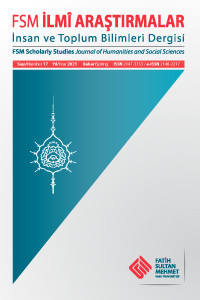BM Güvenlik Konseyi Kararları Çerçevesinde Mali Krizi
BM Güvenlik Konseyi, uluslararası barış, uluslararası insancıl hukuk, kültür valıkları, Güvenlik Konseyi
Mali Crisis Acccording to the Decisions of UN Security Council
the United Nations Security Council, international peace, international humanitarian law, cultural property, Security Council,
___
- Bruha, Thomas - Bortfled, Matthias, Terrorismus und Selstverteidigung – Voraussetzungenund Umfang erlaubter Selstverteidigungsmassnahmen nach denAnschalegen von 11. September 2001, in Vereinte Nationen, 2001.
- ISSN: 2147-3153
- Başlangıç: 2012
- Yayıncı: Fatih Sultan Mehmet Vakıf Üniversitesi
Kelâm İlmi ve Güncel Şüpheler “Teodise Problemi: İmam Matürîdî Örneği”
Ahmet Oktay’ın Gözünden 1960’larda Türk Basınında Siyasi Kamplaşma
Örgütsel Adaletin İş Tatmini Üzerindeki Etkisinde Örgütsel Bağlılığın Aracılık Etkisi
Melek ASTAR, Erdi BAHADIR, Fatma UMUTLU
Fatih Fevzipaşa Caddesi’nin Açılışı ve İstanbul’un Kentsel Gelişimindeki Yeri
Feyza İLTER, Nuran KARA PİLEHVARİAN
Osmanlı’da Matbu İslam’ın Onay ve Denetimi: Tedkîk-i Mesâhif ve Müellefât-ı Şer‘iyye Meclisi
Kırsal Mimarlık Mirasının Korunmasında Turizmin Etkisi: Çanakkale - Adatepe Köyü
Ezgi ALYAKUT, Ceylan İrem GENÇER
İlknur ÇEVİK TEKİN, Tahir AKGEMCİ
Afif Damadı Hattat Osman Efendi (?-1806)
